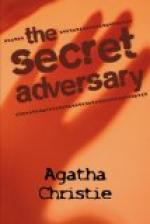Tuppence stared. Mr. Carter nodded.
“Yes, five years ago, that draft treaty was a weapon in our hands; to-day it is a weapon against us. It was a gigantic blunder. If its terms were made public, it would mean disaster.... It might possibly bring about another war—not with Germany this time! That is an extreme possibility, and I do not believe in its likelihood myself, but that document undoubtedly implicates a number of our statesmen whom we cannot afford to have discredited in any way at the present moment. As a party cry for Labour it would be irresistible, and a Labour Government at this juncture would, in my opinion, be a grave disability for British trade, but that is a mere nothing to the real danger.”
He paused, and then said quietly:
“You may perhaps have heard or read that there is Bolshevist influence at work behind the present Labour unrest?”
Tuppence nodded.
“That is the truth. Bolshevist gold is pouring into this country for the specific purpose of procuring a Revolution. And there is a certain man, a man whose real name is unknown to us, who is working in the dark for his own ends. The Bolshevists are behind the Labour unrest—but this man is behind the Bolshevists. Who is he? We do not know. He is always spoken of by the unassuming title of ‘Mr. Brown.’ But one thing is certain, he is the master criminal of this age. He controls a marvellous organization. Most of the Peace propaganda during the war was originated and financed by him. His spies are everywhere.”
“A naturalized German?” asked Tommy.
“On the contrary, I have every reason to believe he is an Englishman. He was pro-German, as he would have been pro-Boer. What he seeks to attain we do not know—probably supreme power for himself, of a kind unique in history. We have no clue as to his real personality. It is reported that even his own followers are ignorant of it. Where we have come across his tracks, he has always played a secondary part. Somebody else assumes the chief role. But afterwards we always find that there has been some nonentity, a servant or a clerk, who has remained in the background unnoticed, and that the elusive Mr. Brown has escaped us once more.”
“Oh!” Tuppence jumped. “I wonder——”
“Yes?”
“I remember in Mr. Whittington’s office. The clerk—he called him Brown. You don’t think——”
Carter nodded thoughtfully.
“Very likely. A curious point is that the name is usually mentioned. An idiosyncrasy of genius. Can you describe him at all?”
“I really didn’t notice. He was quite ordinary—just like anyone else.”
Mr. Carter sighed in his tired manner.
“That is the invariable description of Mr. Brown! Brought a telephone message to the man Whittington, did he? Notice a telephone in the outer office?”




